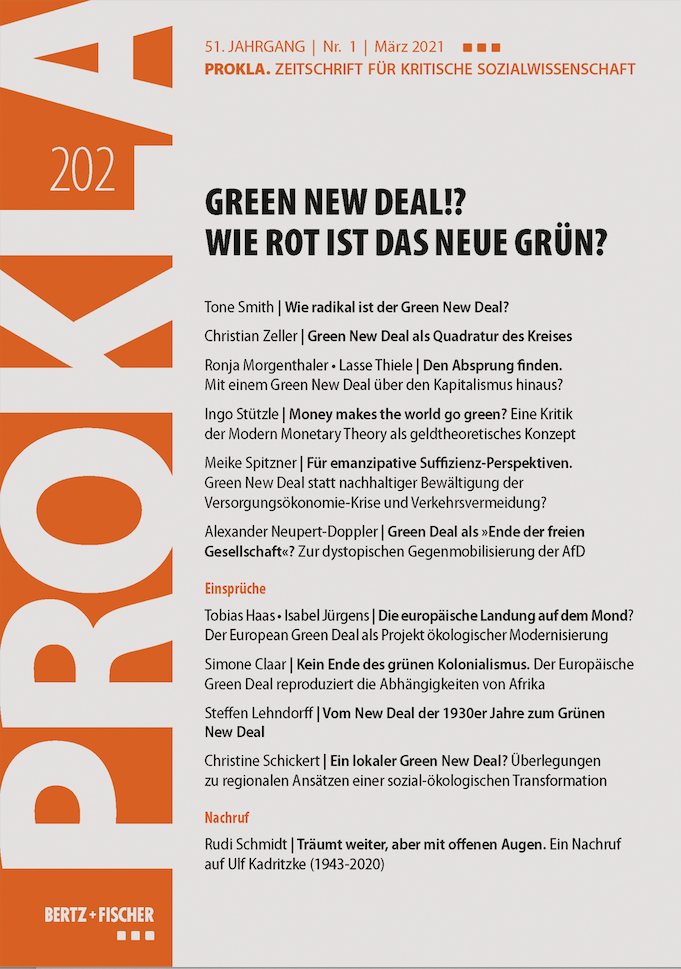Money makes the world go green?
Eine Kritik der Modern Monetary Theory als geldtheoretisches Konzept
DOI:
https://doi.org/10.32387/prokla.v51i202.1930Schlagwörter:
Geldtheorie, Staatsfinanzen, Modern Monetary Theory, MMT, Green New DealAbstract
In den letzten Jahren ist ein geldtheoretisches Konzept prominent geworden, das für sich beansprucht, mit den Irrtümern der ökonomischen Orthodoxie zu brechen und eine Antwort auf die Frage zu geben, wie etwa ein Green New Deal finanziert werden kann: Modern Monetary Theory (MMT). Der Beitrag diskutiert vor dem Hintergrund der marxschen Theorie die geld- und kapitalismustheoretischen Prämissen von MMT. Entgegen ihrer Bezeichnung ist MMT weder modern noch spielt bei ihr Geld für das Verständnis der kapitalistischen Ökonomie eine zentrale Rolle, was zu analytischen, politischen und strategischen Fehlschlüssen führt.
Downloads
Literaturhinweise
Anderson, Perry (1979): Die Entstehung des absolutistischen Staates. Frankfurt/M.
Desan, Christine (2014): Making Money: Coin, Currency, and the Coming of Capitalism. Oxford. DOI: https://doi.org/10.1093/acprof:oso/9780198709572.001.0001.
DIW-Wochenbericht: Eurokrise: Nicht die Nerven verlieren. DIW-Wochenbericht, Nr. 44. Berlin.
Ehnts, Dirk (2015): Geld und Kredit: Eine €-päische Perspektive. Marburg.
– (2017): »Modern Monetary Theory« und Europäische Makroökonomie. In: Berliner Debatte INITIAL (28)3: 89-102.
– (2020): Welche Rolle die MMT bei der Finanzierung des ökologischen Umbaus der Wirtschaft leisten kann. URL: https://theorieblog.attac.de/welche-rolle-die-mmt-bei-der-finanzierung-des-oekologischen-umbaus-der-wirtschaft-leisten-kann/, Zugriff am: 23.12.2020.
Ganßmann, Heiner (2015a): Geld als Fiktion? Warum Geld kein Kredit ist und das Publikum so schwer von seiner Stabilität zu überzeugen ist. In: PROKLA 179 (45)2: 199-216. DOI: https://doi.org/10.32387/prokla.v45i179.217.
– (2015b): Modern Money Theory – eine Kritik. In: Z. Zeitschrift für marxistische Erneuerung (26)102: 41-51.
Gerstenberger, Heide (2017): Markt und Gewalt. Die Funktionsweise des historischen Kapitalismus. Münster.
Hockett, Robert / James, Aaron (2020): Money from Nothing. Or, Why We Should Stop Worrying About Debt and Learn to Love the Federal Reserve. New York-London.
Höfgen, Maurice (2020): Mythos Geldknappheit. Modern Monetary Theory oder warum es am Geld nicht scheitern muss. Stuttgart.
Ingham, Geoffrey (2004): The Nature of Money. Cambridge/UK.
Esser, Josef / Fach, Wolfgang (1983): Sparen und Herrschen. Über den Zusammenhang von fiskalischer Knappheit und autoritärer Politik. In: Hartwich, Hans-Hermann (Hg.): Gesellschaftliche Probleme als Anstoß und Folge von Politik. Opladen: 433-446.
Kaufmann, Stephan / Muzzupappa, Antonella (2020): Crash Kurs Krise. Wie die Finanzmärkte funktionieren. Eine kritische Einführung. Berlin.
Kelton, Stephanie (2020): The Deficit Myth. Modern Monetary Theory and How to Build a Better Economy. New York (epub).
Keynes, John Maynard (1931): Vom Gelde. Berlin 1983.
– (1936): Allgemeine Theorie der Beschäftigung, des Zinses und des Geldes. Berlin 2002.
Krätke, Michael R. (2009): Kritik der öffentlichen Finanzen. Die Finanzkrise des Staates erneut betrachtet. In: PROKLA 154 (39)1: 119-139. DOI: https://doi.org/10.32387/prokla.v39i154.445.
Lapavitsas, Costas / Aguila, Nicolás (2020): Modern monetary theory on money, sovereignty, and policy: A marxist critique with reference to the Eurozone and Greece. In: The Japanese Political Economy: 1-27. DOI: http://doi.org/10.1080/2329194X.2020.1855593.
Lerner, Abba P. (1947): Money as a Creature of the State. In: American Economic Review (37)2: 312-317.
Marx, Karl / Engels, Friedrich Werke [MEW], herausgegeben von der Rosa-Luxemburg-Stiftung. Berlin 1956ff.
Mitchell Innes, Alfred (1913): What is Money. In: The Banking Law Journal (30)5: 377-408.
Mitchell, William (2015): Dystopie Eurozone. Gruppendenken und Leugnung im großen Stil. Berlin 2017.
– / Fazi, Thomas (2017): Reclaiming the State. A Progressive Vision of Sovereignty for a Post-Neoliberal World. London.
– / Wray, L. Randall / Watts, Martin J. (2019): Macroeconomics. London.
Mosler, Warren (2010): Die sieben unschuldigen, aber tödlichen Betrügereien der Wirtschaftspolitik. Berlin 2017 (epub).
Negri, Antonio (1979): Über das Kapital hinaus. Berlin 2019.
Nersisyan, Yeva / Wray, L. Randall (2019): How to Pay for the Green New Deal. In: Working Paper des Levy Economics Institute of Bard College, No. 931 (May 2019).
Nuss, Sabine (2010): Der Gebrauchsanleitungs-Kapitalismus. In: LUXEMBURG 2/2010: 28-33.
Reden, Sitta von (2007): Wie Geld die Welt verändert hat. In: Bergsdorf, Wolfgang / Ettrich, Frank / Kill, Heinrich H., u.a. (Hg.): Am Gelde hängt, zum Gelde drängt… Ringvorlesung der Universität Erfurt in Zusammenarbeit mit der Fachhochschule Erfurt. Erfurt: 117-131.
Schinasi, Garry J. / Kramer, Charles F. / Smith, R. Todd (2001): Financial Implications of the Shrinking Supply of U.S. Treasury Securities, IMF Working Paper 01/61. Washington/DC.
Shaikh, Anwar (2016): Capitalism. Competition, Conflict, Crises. Oxford.
Spahn, Heinz-Peter (2007): Money as a Social Bookkeeping Device. From Mercantilism to General Equilibrium Theory. In: Marcuzzo, Maria Cristina / Giacomin, Alberto (Hg.): Money and Markets. London: 150-165.
Troost, Axel / Hersel, Philipp (2013): Was passiert, wenn die EZB Verluste macht? Die Gefahren für die SteuerzahlerInnen und Inflation sind erfreulich begrenzt!, URL: https://www.alternative-wirtschaftspolitik.de/de/article/342.axel-troost-und-philipp-hersel.html, Zugriff am: 16.12.2020.
Wendl, Michael (2020): Müssen Staatsanleihen zurückgezahlt werden? Über Vorurteile und Mythen. In: Sozialismus11/2020: 53-56.
Wray, L. Randall (1998): Modernes Geld verstehen. Der Schlüssel zu Vollbeschäftigung und Preisstabilität. Berlin 2018.
– (2000): Modern money. In: Smithin, John (Hg.): What is Money? London-New York: 42-66.
– (2014): From the State Theory of Money to Modern Money Theory: An Alternative to Economic Orthodoxy. In: Levy Economics Institute Working Paper No. 792.
– (2019): Alternative paths to modern money theory. In: Real-World Economics Review89: 5-22.
– / Bell, Stephanie (2004): Introduction. In: Wray, L. Randall (Hg.): Credit and State Theories of Money. The Contributions of A. Mitchell Innes. Cheltenham: 1-13.





